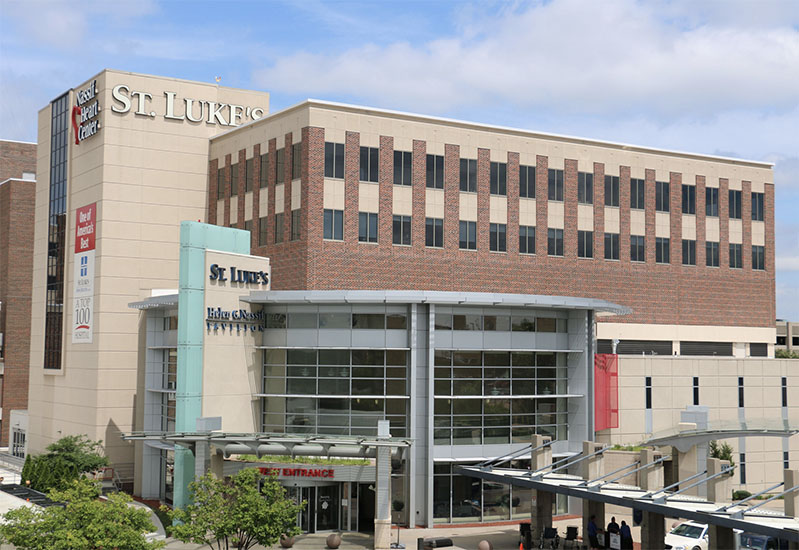
UnityPoint Health – St. Luke’s Hospital in Cedar Rapids, shown in a file photo. CREDIT UNITYPOINT
By Dave DeWitte
dave@corridorbusiness.com
With state health officials announcing six new positive cases of COVID-19 coronavirus on Tuesday, Corridor hospitals are preparing for the expected surge in cases, while doing their best to prevent the spread of the virus and protect staff members they’ll need to meet demand for patient care.
New precautions included visitor restrictions, visitor screenings and requirements that patients with possible COVID-19 symptoms call ahead before coming to the hospital to reduce the risk of transmission.
“We certainly are prepared,” said Dr. Dustin Arnold, chief of the medical staff at UnityPoint Health – St. Luke’s Hospital in Cedar Rapids. The hospital has about 60 beds of surge capacity, Dr. Arnold said, and also has the ability to repurpose operating rooms as intensive care rooms, and anesthesia machines as ventilators if needed to care for acute cases of the COVID-19 virus.
“We could add 12 ICU rooms with a snap of the fingers,” Dr. Arnold said.
Communication with staff has been crucial, Dr. Arnold said, but UnityPoint Health – St. Luke’s was ahead of the game because it already had procedures developed for the possible arrival of the Ebola outbreak of 2014-16, and could activate procedures it used to handle higher patient volumes when the Cedar River flood of 2008 left it as the only hospital taking patients.
University of Iowa Hospital and Clinics was the only Corridor hospital caring for patients with COVID-19 as of March 16, although Mercy Iowa City announced the following day that it has also treated two patients who tested positive.
The University of Iowa Health Care system has implemented a video visit option to improve convenience and reduce the risk of transmission for patients with coronavirus-like symptoms they wanted to have checked out. They can schedule such video visit through the MyChart app on the computer or smartphone. If COVID-19 is indicated by the video exam, the patient is provided with a mask to wear to reduce the risk of transmitting it to others during a subsequent in-person visit to a UIHC office.
An offsite COVID-19 screening site has been designated by UnityPoint – St. Luke’s Hospital at one of its urgent care clinics in Cedar Rapids, according to Dr. Arnold. The clinic has a separate intake area for those wanting to be checked for COVID-19 to reduce transmission risk. UIHC and Mercy Iowa City have also established temporary screening facilities for those suspected of having the virus.
Visitor restrictions have become the norm, and include screening of hospital visitors to reduce transmission risk. Unity Point – St. Luke’s and others joined in following the recommendations of the Centers for Disease Control to screen visitors. Hospitals used their websites to update patients on which entrances would be used to screen visitors, and which would be closed to the public.
“We have limited visitors to two health adults per patient at any one time (no children) and are screening all visitors,” Mercy Iowa City’s Director of Communications Margaret Reese explained in an email. “We have also limited the public access points to three, and screening takes place at each.”
UIHC began screening visitors at entrances on March 13, and Mercy Medical Center in Cedar Rapids restricted the number of entrances and began screening patients, visitors and employees at entrances on March 17. The screening includes questions about the visitor’s travel history and health, and a check of their surface temperature. In addition, valet services were canceled at the hospital’s Lundy Pavilion and Hall-Perrine Cancer Center. Screening was also instituted at Mercy Medical Center’s Pediatric Clinic, Birthplace and Surgery Center.
Supplies holding up
Getting the necessary protective equipment has so far not been a problem for UnityPoint Health St. Luke’s, although it cannot get all that it would like. That’s because supplies of high-demand items such as protective masks have been put on allocation.
The positive side of the supply situation is that supplies of shortage items can be shifted within the UnityPoint system to where the need is greatest, Dr. Arnold said. Since it’s unlikely that the coronavirus will peak at the same time across UnityPoint’s multi-state network of hospitals, that could well be of practical benefit.
Demand for coronavirus screening at UnityPoint Health – St. Luke’s has been relatively light, Dr. Arnold said, and none of those screened has yet tested positive. Test kit availability, handled through the Iowa Department of Public Health, has so far not been a challenge.
The availability of test kits is less a matter of patient treatment than of tracking the disease, Dr. Arnold said. There is currently no medicine specifically to treat the coronavirus, so patients would be treated much the same as patients with other respiratory concerns such as viral pneumonia.
All Corridor hospitals are adamant about the need to follow precautions for preventing the spread of COVID-19. Dr. Arnold one way they do it is by making irrelevant comparisons to influenza.
The percentage of patients infected with COVID-19 who die is much higher than the percentage of influenza patients, Dr. Arnold said, and COVID-19 is spreading much faster, in part because there’s no vaccine available. So, while there could be 1.2 million Americans sick with influenza spread throughout the year, the COVID-19 threat is more challenging.
“What would happen if those 1.2 million got sick in one week and they all went to the hospital? Dr. Arnold asked. “It would collapse the medical system.”
The answer, he said, is to reduce the number infected as the current round of coronavirus peaks, by using prevention. Even then, he said, it may be necessary to worry about another coronavirus peak in the fall. CBJ
UPDATE 3/18/20: This story was updated to correct the wrong name used for Dr. Dustin Arnold.




